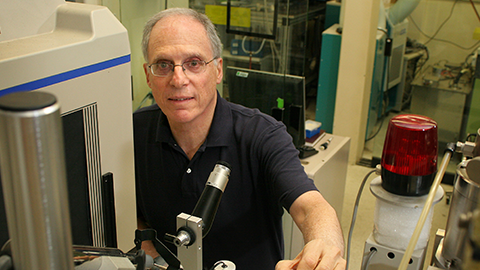Eisenberg lauded for work on amyloid fiber structure
David Eisenberg, a professor at the University of California, Los Angeles, is the second winner of the American Society for Biochemistry and Molecular Biology’s Bert and Natalie Vallee Award in Biomedical Science.

The award was established by the Bert and N. Kuggie Vallee Foundation in 2012 to recognize established scientists with outstanding accomplishments in basic biomedical research. Eisenberg’s research focuses primarily on protein interactions as well as the structural underpinnings for the conversion of normal proteins to the amyloid state and the conversion of prions to the infectious state.
Sabeeha Merchant and James Bowie at UCLA, who nominated Eisenberg for the award, said in their nomination letter, “David’s achievements are truly remarkable, not only because of their enormous fundamental impact on the fields of medicine, but also because success was so improbable. He has transformed the field of amyloid diseases and is exceedingly deserving of this recognition.
In 2005, Eisenberg’s group published the first atomic-resolution structure of an amyloid fiber. His work led to other researchers determining the atomic-level structures of more than 100 other fibers. These structure determinations have revolutionized the field.
Eisenberg’s work enabled the development of algorithms to predict segments of proteins with high propensity to form amyloid fibers and provide useful hypotheses for amyloid-forming mechanisms in many disease-related proteins. His research also opened up the possibility of true atomic-level drug-design approaches to prevent fiber formation. Eisenberg’s group has worked on drug design too, and several candidates are in development.
Although Eisenberg started his career looking at protein structure and binding affinity, he developed an interest in the role of aberrant proteins in neurodegenerative diseases. Eventually, his combined passion for medicine and basic research led him to consider fundamental scientific questions about neurodegenerative diseases.
Eisenberg began his career as an undergraduate at Harvard University under the tutelage of protein scientist John Edsall. He became interested in the computational and physical sciences as well as the biochemical sciences. Eisenberg went on to get a D. Phil. at Oxford University in the U.K. In 1989, he was elected to the National Academy of Sciences. He has received numerous awards, such as the Amgen Award of the Protein Society in 2000 and the Harvey International Prize in Human Health in 2009.
Enjoy reading ASBMB Today?
Become a member to receive the print edition four times a year and the digital edition monthly.
Learn moreGet the latest from ASBMB Today
Enter your email address, and we’ll send you a weekly email with recent articles, interviews and more.
Latest in People
People highlights or most popular articles

2026 ASBMB election results
Meet the new Council members and Nominating Committee member.

Simcox wins SACNAS mentorship award
She was recognized for her sustained excellence in mentorship and was honored at SACNAS’ 2025 National Conference.

From humble beginnings to unlocking lysosomal secrets
Monther Abu–Remaileh will receive the ASBMB’s 2026 Walter A. Shaw Young Investigator Award in Lipid Research at the ASBMB Annual Meeting, March 7-10 in Washington, D.C.

Chemistry meets biology to thwart parasites
Margaret Phillips will receive the Alice and C. C. Wang Award in Molecular Parasitology at the ASBMB Annual Meeting, March 7-10 in Washington, D.C.

ASBMB announces 2026 JBC/Tabor awardees
The seven awardees are first authors of outstanding papers published in 2025 in the Journal of Biological Chemistry.

Decoding how bacteria flip host’s molecular switches
Kim Orth will receive the Earl and Thressa Stadtman Distinguished Scientists Award at the ASBMB Annual Meeting, March 7–10, just outside of Washington, D.C.

